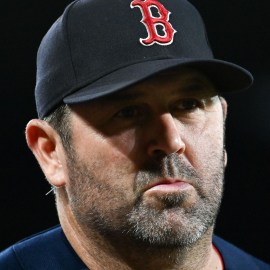It’s a shame that the most memorable moment of Tim Wakefield’s baseball career might have been his worst.
The former Red Sox pitcher died Sunday at the way-too-early age of 57 following a battle with brain cancer. His 17-year playing career rightfully takes the backseat to all he did off the field, the lives he impacted away from the diamond. By all accounts, he was a truly great person who cherished making positive impacts on the lives of others. He was a good human being who just happened to be paid to play professional baseball.
He was damn good at that, too, although his altruism made that easy to forget. It also didn’t help that the defining moment of his career was being on the wrong end of Aaron Boone’s home run in the 2003 American League Championship Series. Despite New York’s inability to win the World Series that fall, it still remains one of the most memorable moments in Red Sox-Yankees history.
Of course, the only reason Wakefield was on the mound that October night in the Bronx was because of his selflessness, durability and versatility. Thankfully, it’s those intangibles that ultimately defined Wakefield’s professional baseball career, but the numbers might be even better than you remember.
Story continues below advertisement
He was an All-Star in 2009 and finished third in Cy Young Award voting in 1995, but also consider this: No player in the 122-year history of the historic franchise started more games, threw more innings or faced more batters. Only Roger Clemens — owner of the most Cy Young trophies in baseball history — and, well, Cy Young himself won more games in a Red Sox uniform. Only Clemens recorded more strikeouts. Only 117 pitchers in the history of the sport won more games than Wakefield, who finished with an even 200.
Granted, Wakefield racked up a lot of those counting stats because of how many times he took the mound compared to some of the other all-time pitching greats in Sox history. But there’s something to be said for that ability, too. The knuckleball’s unpredictability certainly contributed to a lot of bad days in Wakefield’s career. However, it also enabled him to pitch for so long, and there’s definite value in that. Wakefield eclipsed 180 innings nine times in his career, going over the 200-frame mark on five separate occasions — including the 1997 season when he lost a league-high 15 games.
More Tim Wakefield
He was willing to do whatever he needed to help the team. Not only did Wakefield start more games than any pitcher in team history, but he also came out of the bullpen 160 times in the regular season and seven more times in the playoffs, including that fateful night in 2003.
Wakefield’s career postseason numbers (6.75 ERA) might not stack up with Sandy Koufax or John Smoltz. That doesn’t mean, though, that he didn’t have his moments. He allowed just six earned runs in 18 innings with the Pirates in the 1992 National League Championship Series. He probably would have been the MVP had the Pirates held on to beat Atlanta. In 2003, the Boone home run overshadowed the fact that Wakefield had allowed just six earned in 20 2/3 innings up until that point in the playoffs, with the Red Sox winning three of his four appearances.
Story continues below advertisement
Fast-forward a year, and Wakefield did get roughed up early in the 2004 ALCS against the Yankees. He was willing to wear it in the ugly 19-8 Game 3 loss, a defeat that ultimately was Boston’s final of the season. His 3 1/3 innings saved the pitching staff and helped set the stage for the club’s history-making comeback. He played a big role in that, too, pitching three innings of one-hit ball and getting the win in Boston’s extra-innings Game 5 thriller that sent the series back to New York.
“How valuable is Wakefield to these Red Sox?” Joe Buck asked on the FOX broadcast as the right-hander flummoxed Ruben Sierra with a knuckler to get out of the 13th.
As it turned out, Wakefield was more valuable than anyone could ever have imagined.
Featured image via YouTube/NESN


















